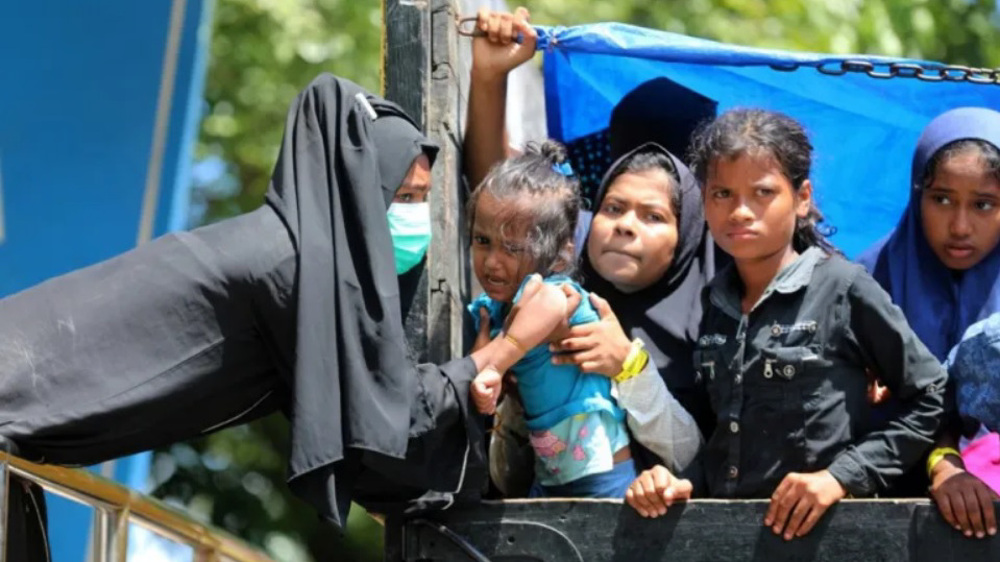UN: Longer-term plans needed to manage Rohingya influx into Bangladesh
The United Nations says longer-term plans are needed to manage the influx of Rohingya Muslim refugees who have fled from Myanmar's Rakhine state to neighboring Bangladesh.
Filippo Grandi, the head of the United Nations refugee agency, told reporters in the Swiss city of Geneva on Wednesday that the nearly half a million Rohingya who had entered Bangladesh since August would likely not be leaving soon.
Aid groups in Bangladesh say makeshift camps in Cox's Bazar are teeming with refugees amid struggles to bring in adequate food and shelter.
The UN official said "possible epidemics" were likely to break out in the camps that seriously lacked hygienic conditions.
"It is most likely that return will take time, if it happens, if the violence stops. It will be important also to find in the medium term suitable solutions for the people that are in Bangladesh."
"The important thing is to get people in places where they can be assisted more easily," Grandi said. "The first challenge is to get people out of the mud and the despair which they are finding themselves in."
The UN official also stated that talks were under way with Bangladeshi authorities for the formation of a "technical committee" to examine options for a longer-term settlement of the Rohingya. "There are in reality many different options that the Bangladesh government is studying, and understandably they are not easy."
UN agency warns about more sexual violence against Rohingya
Meanwhile, the UN's migration agency warned Wednesday about increasing reports of sexual violence against Rohingya Muslims.
International Organization for Migration Director-General William Lacy Swing said he was "shocked and concerned" about the reports of sexual and gender-based violence against Rohingya newly arrived in Cox's Bazar, Bangladesh.
He said rape, sexual assault, domestic violence, child marriage and other forms of gender-based violence have been identified.
The UN agency has estimated that there are more than 800,000 Rohingya currently in Bangladesh.
Tensions remain high in Rakhine, where a massive crackdown by the Myanmar army has driven over 480,000 people into Bangladesh in what the UN has called a campaign of "ethnic cleansing."
Myanmar's de facto leader Aung San Suu Kyi has come under fire for downplaying the violence and failing to condemn the crackdown.
Rohingya forced to eat leaves for survival: Report
In remote villages besieged by Buddhist extremists in Rakhine, there have been reports that the Rohingya are being forced to eat leaves in order to survive. Thousands of Rohingya are feared trapped in the hard-hit areas of Rakhine.
According to a recent report by Reuters, those Rohingya Muslims who remain are playing a cat-and-mouse game with Myanmar's troops who come to villages in the morning, prompting the residents to hide in the forest, and return at night.
A Rohingya Muslim teacher, who refused to give his name because he had been warned by the authorities not to talk to reporters, said, “We don’t even have food to eat for this evening. What can we do?”
“We are close to the forest where we have leaves we can eat and find some water to survive,” he added.

The man said escaping through the bush in monsoon rain with his elderly parents, six children and pregnant wife was not an option.
According to the report, hundreds of cows roam through deserted settlements and charred paddy fields. Hungry dogs eat small goats. The remains of local mosques, markets and schools, once bustling with Rohingya Muslims, are silent, it added.
Suyaid Islam, 32, from Yae Khat Chaung Gwa Son, near the town of Maungdaw, said, “We were scared that the army and the police would shoot us if they found us ... so we ran away from the village.”
Human Rights Watch recently said satellite photos showed that tens of thousands of homes in Rakhine had been destroyed in 214 villages.
Maungdaw itself is now segregated, with the remaining Rohingya shuttered in their homes.
Myanmar’s government brands more than one million Rohingya Muslims in the country as “illegal immigrants” from Bangladesh. Rohingya Muslims, however, have had roots in the country that go back centuries. They are considered by the UN the “most persecuted minority group in the world.”
All US bases, mercenaries within Iran’s reach: Leader’s representative
VIDEO | Lebanon parliament discusses budget in light of deep rifts
Regional states reject use of their territory against Iran
VIDEO | Israeli military destroys Gaza cemetery, scattering remains of over 700 graves
Iran ministry slams EU’s blacklisting of IRGC as 'Illegal, hypocritical'
Hamas blasts Western media for blindly defending false Israeli narrative
ElBaradei condemns US threats of military action against Iran
VIDEO | Red the only colour in Gaza












 This makes it easy to access the Press TV website
This makes it easy to access the Press TV website